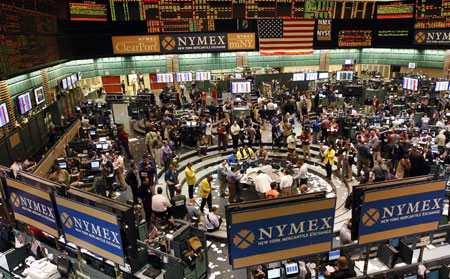Crude-oil futures close below 90 dollars
Updated: 2008-01-23 07:38
NEW YORK - Oil settled at a one-month low on Tuesday amid intensifying worry a weak U.S. economy could trigger a global slowdown in energy demand.
 Traders in the oil options pit of the New York Mercantile Exchange work as oil traded below $90 a barrel, in New York, January 22, 2008. [Agencies] |
Limiting the market's losses, the Federal Reserve slashed interest rates by 75 basis points in a surprise move aimed at averting recession.
"The Fed's aggressive actions ahead of its regularly scheduled meeting was mildly supportive to crude oil market," said Eric Wittenauer, analyst at A.G. Edwards in St. Louis. "But (the Fed) did take emergency action, so that's worrisome and crude oil didn't recover fully."
U.S. crude ettled down 72 cents to $89.85 a barrel -- the first settlement below $90 since December 10. London Brent crude gained 94 cents to $88.45 a barrel.
|
Oil prices had earlier dropped as low as $86.11 a barrel as world stock markets briefly posted their deepest losses since September 11, 2001 amid growing signals that the fallout from the U.S. credit and housing crisis could lead to a recession.
"There's a lot of fear out there. That could make some market participants go into cash until the situation becomes clearer," said Mike Wittner of Societe Generale.
The sell-off has taken oil prices about 10 percent below the all-time peak above $100 a barrel hit January 3, when the market was focusing on tight inventory levels and a robust energy demand outlook.
The U.S. Energy Information Administration may have to rethink its forecasts for U.S. and global oil demand growth if a looming U.S. recession bites into energy usage, an agency analyst said on Tuesday.
"Clearly our forecasts do not assume a recession at the moment, so any recession that did occur would reduce the estimate of our demand increase both here in the U.S. and to an extent, globally," EIA analyst Doug MacIntyre said. "How much, we really haven't done the quantifiable analysis yet."
SPECULATORS SELL?
Goldman Sachs said if all speculative length were liquidated on the oil markets, prices could drop to the low $80s, but fundamentals of supply and demand would probably prevent funds from selling out completely.
China, a major force behind global commodities demand, boosted its imports of crude oil in 2007 by 12.3 percent according to official customs data.
Meanwhile, inventory data in top consumer the United States last week showed the first increase in oil stocks for nine weeks, after they had dropped to the lowest since 2004.
Oil's recent slide has relieved pressure on the Organization of the Petroleum Exporting Countries (OPEC) to agree on a production increase when it meets on February 1.
"Prices are falling and it is a positive thing," UAE Oil Minister Mohammed al-Hamli told Reuters at the Swiss Alpine resort of Davos, which is hosting the annual meeting of the World Economic Forum.
Several OPEC ministers have said there is no need for OPEC to boost output, but Hamli would not be drawn on what he thinks OPEC should do at their next meeting.
"This I think is a very critical period for us. Prices are very volatile," he said.
(Additional reporting by Matthew Robinson in New York, Luke Pachymuthu in Singapore, Randy Fabi, Barbara Lewis and Peg Mackey in London, editing by Marguerita Choy)
|
|
|
||
|
||
|
|
|
|



